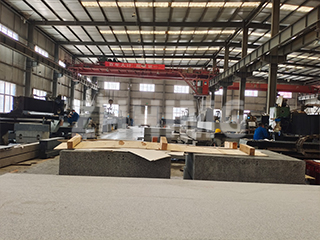Granite, a naturally occurring igneous rock, is widely known for its strength, durability, and aesthetic appeal. It has become a popular choice for both architectural and industrial applications, particularly in the field of precision measurement. The unique properties of granite make it an ideal material for a variety of uses, including construction, engineering, and scientific research.
Granite’s Physical Properties and Benefits:
Granite is formed from volcanic lava that cools and solidifies beneath the Earth’s surface. It is a coarse-grained rock made up primarily of quartz, feldspar, and mica, with feldspar making up 40%-60% and quartz 20%-40%. Its natural composition results in a rock that is dense, hard, and stable, with excellent resistance to wear, pressure, and temperature changes.
Key Advantages of Granite:
-
High Durability and Long Lifespan:
Granite’s ability to withstand the elements for centuries makes it a prime material for both indoor and outdoor applications. Notable examples include the Chiang Kai-shek Memorial Hall in Taipei and the Monument to the People’s Heroes in Beijing, which are made from granite. Even after thousands of years, granite maintains its strength and appearance, as seen in the enduring durability of the Great Pyramids of Egypt. -
Exceptional Strength and Stability:
Granite is one of the hardest natural stones, making it ideal for heavy-duty uses. It is resistant to scratches, impacts, and other forms of physical wear. This makes granite platforms a reliable choice for industrial measurement tools, where precision and durability are crucial. -
Resistant to Temperature Fluctuations:
Granite’s thermal stability ensures it maintains its shape and accuracy even under extreme temperature variations. This property is particularly important in industries where temperature-sensitive equipment requires precision measurement. -
Low Expansion and High Precision:
Granite has a very low coefficient of thermal expansion, which means it will not deform or change shape easily, even when exposed to temperature fluctuations. This is a key feature for precision measurement tools, as it guarantees consistent accuracy over time. -
Corrosion and Rust Resistance:
Granite is naturally resistant to corrosion and does not rust, making it a low-maintenance material for precision components. Unlike metals, granite does not require protective coatings or oils, which reduces maintenance costs and ensures longevity. -
Aesthetic Appeal:
The unique veining and color variations in granite add aesthetic value, making it a favored material for both architectural applications and precision tools. Its polished surface provides an attractive yet durable finish.
Granite Platforms for Precision Measurement:
Granite is widely used in the manufacturing of precision measurement platforms, which are integral to ensuring the accuracy of industrial machinery and instruments. Thanks to its high hardness, low thermal expansion, and dimensional stability, granite platforms can maintain their accuracy over long periods and under heavy usage, making them perfect for high-precision measurement.
Many developed countries, including the United States, Germany, Japan, Switzerland, Italy, France, and Russia, have long relied on granite for the production of measuring instruments and precision mechanical components. These countries recognize the unmatched benefits of using high-quality granite for tools that require utmost precision.
Granite’s Role in Precision Manufacturing:
-
Precision Measurement Tools:
Granite is an essential material for precision measurement tools, used in industries such as aerospace, automotive, and electronics. The material’s ability to retain accuracy and its resistance to environmental factors make it indispensable for the creation of high-precision instruments. -
Micro-Manufacturing and Fine Processing:
In advanced industries, the use of granite is expanding due to its ability to meet the demands of micromachining and fine processing technologies. Its physical properties allow it to perform in cutting-edge environments where precision and stability are critical. -
Future Trends:
As industries push for higher precision, granite’s role in precision engineering will only grow. It will continue to be a cornerstone material for micro-manufacturing, offering unparalleled durability and accuracy that no other material can replicate.
Conclusion:
Granite platforms offer numerous benefits that make them the best choice for precision measurement tools. With its unparalleled durability, resistance to wear, and ability to maintain high levels of accuracy, granite is a material that can withstand the demands of modern industry. Whether you are involved in mechanical engineering, precision machining, or scientific research, granite provides the stable foundation required for high-precision operations.
Post time: Aug-06-2025

